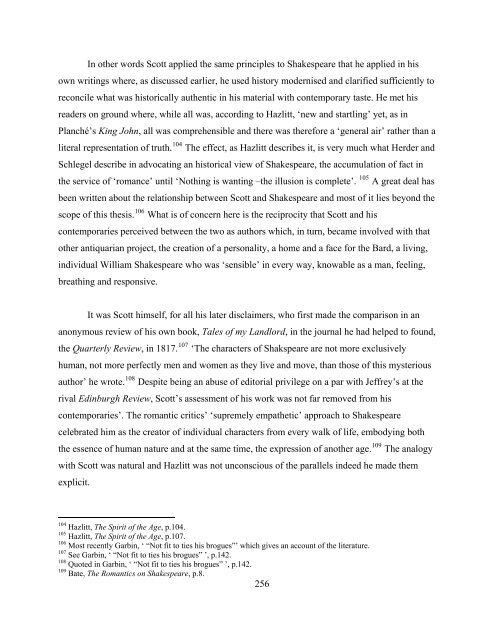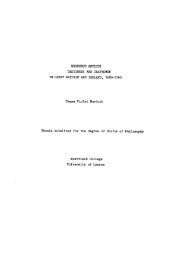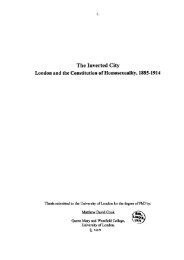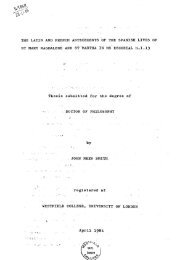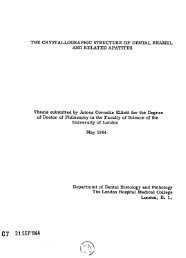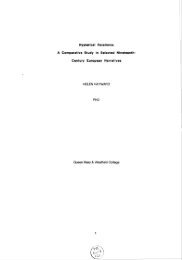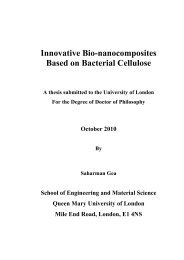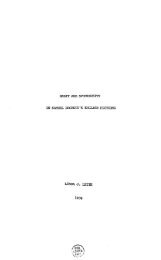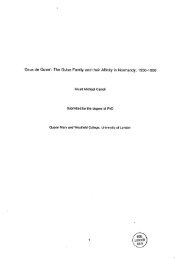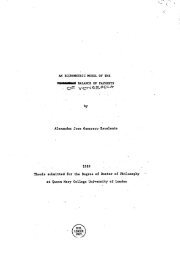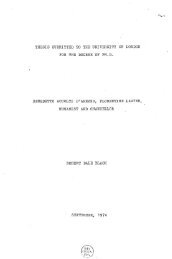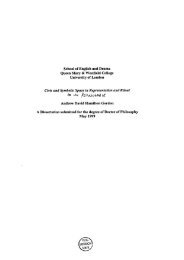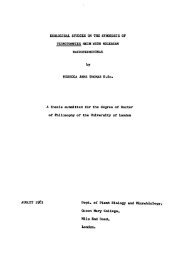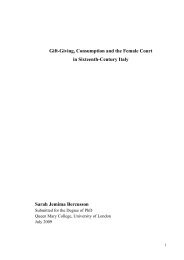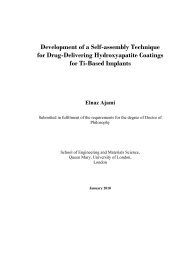Antiquaries in the Age of Romanticism: 1789-1851 - Queen Mary ...
Antiquaries in the Age of Romanticism: 1789-1851 - Queen Mary ...
Antiquaries in the Age of Romanticism: 1789-1851 - Queen Mary ...
You also want an ePaper? Increase the reach of your titles
YUMPU automatically turns print PDFs into web optimized ePapers that Google loves.
In o<strong>the</strong>r words Scott applied <strong>the</strong> same pr<strong>in</strong>ciples to Shakespeare that he applied <strong>in</strong> his<br />
own writ<strong>in</strong>gs where, as discussed earlier, he used history modernised and clarified sufficiently to<br />
reconcile what was historically au<strong>the</strong>ntic <strong>in</strong> his material with contemporary taste. He met his<br />
readers on ground where, while all was, accord<strong>in</strong>g to Hazlitt, ‘new and startl<strong>in</strong>g’ yet, as <strong>in</strong><br />
Planché’s K<strong>in</strong>g John, all was comprehensible and <strong>the</strong>re was <strong>the</strong>refore a ‘general air’ ra<strong>the</strong>r than a<br />
literal representation <strong>of</strong> truth. 104 The effect, as Hazlitt describes it, is very much what Herder and<br />
Schlegel describe <strong>in</strong> advocat<strong>in</strong>g an historical view <strong>of</strong> Shakespeare, <strong>the</strong> accumulation <strong>of</strong> fact <strong>in</strong><br />
<strong>the</strong> service <strong>of</strong> ‘romance’ until ‘Noth<strong>in</strong>g is want<strong>in</strong>g –<strong>the</strong> illusion is complete’. 105 A great deal has<br />
been written about <strong>the</strong> relationship between Scott and Shakespeare and most <strong>of</strong> it lies beyond <strong>the</strong><br />
scope <strong>of</strong> this <strong>the</strong>sis. 106 What is <strong>of</strong> concern here is <strong>the</strong> reciprocity that Scott and his<br />
contemporaries perceived between <strong>the</strong> two as authors which, <strong>in</strong> turn, became <strong>in</strong>volved with that<br />
o<strong>the</strong>r antiquarian project, <strong>the</strong> creation <strong>of</strong> a personality, a home and a face for <strong>the</strong> Bard, a liv<strong>in</strong>g,<br />
<strong>in</strong>dividual William Shakespeare who was ‘sensible’ <strong>in</strong> every way, knowable as a man, feel<strong>in</strong>g,<br />
breath<strong>in</strong>g and responsive.<br />
It was Scott himself, for all his later disclaimers, who first made <strong>the</strong> comparison <strong>in</strong> an<br />
anonymous review <strong>of</strong> his own book, Tales <strong>of</strong> my Landlord, <strong>in</strong> <strong>the</strong> journal he had helped to found,<br />
<strong>the</strong> Quarterly Review, <strong>in</strong> 1817. 107 ‘The characters <strong>of</strong> Shakspeare are not more exclusively<br />
human, not more perfectly men and women as <strong>the</strong>y live and move, than those <strong>of</strong> this mysterious<br />
author’ he wrote. 108 Despite be<strong>in</strong>g an abuse <strong>of</strong> editorial privilege on a par with Jeffrey’s at <strong>the</strong><br />
rival Ed<strong>in</strong>burgh Review, Scott’s assessment <strong>of</strong> his work was not far removed from his<br />
contemporaries’. The romantic critics’ ‘supremely empa<strong>the</strong>tic’ approach to Shakespeare<br />
celebrated him as <strong>the</strong> creator <strong>of</strong> <strong>in</strong>dividual characters from every walk <strong>of</strong> life, embody<strong>in</strong>g both<br />
<strong>the</strong> essence <strong>of</strong> human nature and at <strong>the</strong> same time, <strong>the</strong> expression <strong>of</strong> ano<strong>the</strong>r age. 109 The analogy<br />
with Scott was natural and Hazlitt was not unconscious <strong>of</strong> <strong>the</strong> parallels <strong>in</strong>deed he made <strong>the</strong>m<br />
explicit.<br />
104<br />
Hazlitt, The Spirit <strong>of</strong> <strong>the</strong> <strong>Age</strong>, p.104.<br />
105<br />
Hazlitt, The Spirit <strong>of</strong> <strong>the</strong> <strong>Age</strong>, p.107.<br />
106<br />
Most recently Garb<strong>in</strong>, ‘ “Not fit to ties his brogues”’ which gives an account <strong>of</strong> <strong>the</strong> literature.<br />
107<br />
See Garb<strong>in</strong>, ‘ “Not fit to ties his brogues” ’, p.142.<br />
108<br />
Quoted <strong>in</strong> Garb<strong>in</strong>, ‘ “Not fit to ties his brogues” ’, p.142.<br />
109<br />
Bate, The Romantics on Shakespeare, p.8.<br />
256


